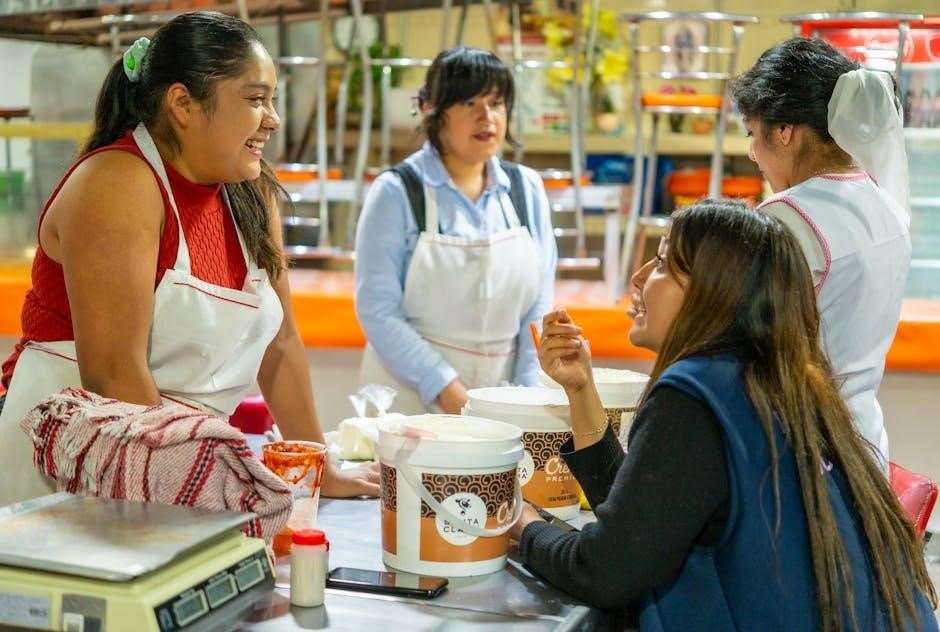
Workshop techniques are structured activities designed to enhance collaboration‚ creativity‚ and problem-solving. They provide practical tools for teams to achieve goals‚ foster innovation‚ and improve productivity. PDF materials often serve as valuable resources‚ offering step-by-step guides and best practices for effective facilitation and engagement. These techniques are widely used in various fields‚ from agile development to educational settings‚ to ensure successful outcomes and participant satisfaction. By leveraging these methods‚ workshops become dynamic spaces for growth and learning.
1.1. What are Workshop Techniques?
Workshop techniques are activity-based methods designed to foster collaboration‚ creativity‚ and problem-solving within groups. These structured approaches aim to engage participants‚ encourage innovation‚ and ensure productive outcomes. Techniques include brainstorming sessions‚ ideation exercises‚ and interactive activities tailored to specific goals. They are widely applied in fields like design thinking‚ agile development‚ and education. PDF resources often provide detailed guides‚ outlining step-by-step processes and best practices for effective facilitation. By leveraging these methods‚ workshops become dynamic environments where participants can share ideas‚ address challenges‚ and achieve tangible results. These techniques ensure that workshops are both engaging and purpose-driven‚ catering to diverse needs and objectives.
1.2. Importance in Modern Workshops
Workshop techniques are indispensable in modern settings‚ fostering collaboration‚ creativity‚ and efficiency. They help teams align on goals‚ generate innovative solutions‚ and achieve tangible outcomes. In today’s fast-paced environments‚ these methods ensure that workshops are engaging and productive. PDF resources play a crucial role by providing structured guides and practical tools‚ enabling facilitators to lead sessions effectively. By incorporating these techniques‚ workshops become essential for driving progress‚ enhancing communication‚ and fostering a culture of continuous improvement. Their relevance spans industries‚ making them a cornerstone of effective team management and problem-solving in both professional and educational contexts.

Key Techniques for Effective Workshops
Effective workshops rely on structured exercises‚ active engagement‚ and practical tools. Techniques like mind mapping‚ SWOT analysis‚ and ground rules ensure focused discussions and productive outcomes. These methods enhance collaboration and creativity‚ making workshops impactful and goal-oriented.

2.1. Ideation and Brainstorming
Ideation and brainstorming are core techniques in workshops‚ fostering creativity and innovation. These methods encourage participants to generate diverse ideas freely‚ without immediate criticism. Brainstorming sessions‚ often guided by facilitators‚ help teams break out of their usual thought patterns. Techniques like mind mapping and SWOT analysis further enhance idea generation by visually organizing thoughts. According to resources‚ such as “Workshop Tactics‚” these exercises are particularly effective when conducted in comfortable environments‚ ensuring participants feel secure to express their thoughts. By focusing on quantity over quality initially‚ workshops can yield a wide range of solutions‚ which are then refined for practical application.

2.2. Icebreakers and Engagement Activities
Icebreakers and engagement activities are essential for initiating workshops‚ fostering a welcoming atmosphere‚ and encouraging participation. These exercises help participants feel comfortable‚ break down barriers‚ and establish connections. Simple games‚ quick introductions‚ or confidence-based questions can effectively energize the group. For example‚ asking participants about their expectations or past experiences can spark initial engagement. These activities ensure that everyone feels valued and prepared to contribute‚ setting a positive tone for the workshop. They are particularly useful at the start of sessions or when diverse groups are gathering for the first time. Engagement activities also help facilitators gauge the group’s dynamics and readiness for deeper collaboration.

The Role of Environment in Workshops
The environment significantly impacts workshop dynamics. A well-designed space with comfortable seating‚ ample lighting‚ and proper layout enhances creativity and focus. It ensures participants feel at ease.

3.1. Physical Setup and Space Utilization
The physical setup of a workshop is crucial for maximizing engagement and productivity. A well-organized space ensures participants can move freely and interact comfortably. Comfortable seating‚ adequate lighting‚ and sufficient room for activities are essential. The layout should encourage collaboration‚ with round tables or open arrangements fostering teamwork. Proper space utilization also involves ensuring visibility of materials and tools‚ such as whiteboards or screens‚ for shared discussions. A thoughtfully designed environment helps create a distraction-free zone‚ allowing participants to focus on the workshop’s objectives. The space should also be adaptable to accommodate different workshop techniques and activities seamlessly.
3.2. Creating a Comfortable Atmosphere
A comfortable atmosphere is vital for fostering engagement and productivity in workshops. Lighting‚ noise levels‚ and seating arrangements should be carefully considered to ensure participants feel at ease. Psychological comfort is equally important‚ with an emphasis on creating a safe‚ inclusive environment where all voices are heard. Encouraging open communication and respect among participants helps build trust. Additionally‚ incorporating breaks and flexibility into the schedule can reduce stress and maintain energy levels. A well-crafted atmosphere not only enhances collaboration but also promotes creativity and focus‚ making the workshop experience more enjoyable and effective for everyone involved. Attention to these details ensures a positive and productive session.

Facilitation Best Practices

Facilitation involves actively listening‚ guiding discussions‚ and ensuring all voices are heard. Setting clear expectations and ground rules helps maintain focus and productivity‚ fostering a collaborative environment where progress is achievable. This approach ensures workshops remain engaging and goal-oriented‚ with the facilitator acting as a neutral guide rather than an expert. By creating a safe space for open dialogue‚ facilitators empower participants to contribute effectively‚ leading to meaningful outcomes and shared understanding. Effective facilitation is key to unlocking the full potential of any workshop. Proper techniques ensure sessions remain structured yet flexible‚ accommodating diverse perspectives and needs. This balance is essential for success. Always encourage participation and manage time wisely. Tools like agendas and feedback loops enhance the process‚ keeping everyone aligned and motivated. Active engagement and adaptability are crucial for addressing challenges and maintaining momentum. Overall‚ skilled facilitation transforms workshops into dynamic‚ productive experiences that drive results. Collaboration thrives when facilitators prioritize clarity‚ inclusivity‚ and responsiveness to the group’s needs. Effective communication and empathy are vital in navigating discussions‚ ensuring all participants feel valued and heard. Balancing structure with flexibility allows for creativity and problem-solving‚ making workshops both efficient and impactful. Skilled facilitators anticipate needs‚ manage conflicts‚ and maintain a positive atmosphere‚ ensuring sessions are productive and fulfilling. Continuous improvement through feedback and reflection further enhances the facilitation process‚ leading to better outcomes over time. Effective facilitation is the cornerstone of successful workshops‚ enabling teams to achieve their objectives effectively. By focusing on these best practices‚ facilitators can create environments where collaboration flourishes and goals are met. The role of a facilitator is to empower‚ guide‚ and support‚ ensuring every workshop is a step toward success. Sustaining engagement and motivation requires creativity and adaptability‚ making each session unique and valuable. Ultimately‚ facilitation is about enabling others to shine‚ fostering growth‚ and driving collective progress. This approach ensures workshops are not just events but catalysts for meaningful change and innovation. With the right techniques‚ any workshop can become a powerful tool for achieving excellence and overcoming challenges. The art of facilitation lies in its ability to transform ordinary meetings into extraordinary opportunities for connection and advancement. By mastering these best practices‚ facilitators can elevate workshops to new heights‚ creating lasting impacts and unforgettable experiences. The journey to becoming an exceptional facilitator is ongoing‚ with each session offering new lessons and opportunities for refinement. Embracing this journey ensures continuous improvement and increasingly successful workshops. In the end‚ the goal is to empower participants‚ foster collaboration‚ and drive results‚ making every workshop a resounding success. Effective facilitation is the key to unlocking this potential‚ turning vision into reality through structured yet flexible guidance. The power of facilitation lies in its ability to bring people together‚ align them toward common goals‚ and inspire them to achieve greatness. This is the essence of successful workshops and the heart of exceptional facilitation. By adhering to these best practices‚ facilitators can create environments where creativity flows‚ challenges are overcome‚ and progress is made. The impact of skilled facilitation is immeasurable‚ leaving a lasting legacy of collaboration and achievement. As workshops evolve‚ so too do the techniques that make them effective‚ ensuring they remain relevant and impactful in an ever-changing world. The future of facilitation is bright‚ with endless possibilities for innovation and growth. Embrace these best practices and watch your workshops thrive‚ becoming beacons of productivity and success. The art of facilitation is a journey‚ not a destination‚ and every step forward brings new opportunities for excellence. Seize these moments‚ and your workshops will become the cornerstone of your team’s success. In conclusion‚ facilitation best practices are the foundation upon which exceptional workshops are built. They provide the tools‚ techniques‚ and mindset needed to lead groups effectively‚ ensuring every session is productive and fulfilling. By mastering these practices‚ facilitators can create environments where collaboration thrives‚ ideas flow freely‚ and goals are consistently met. The power to transform ordinary gatherings into extraordinary experiences lies within these best practices‚ waiting to be harnessed by skilled facilitators. Let your workshops be the spaces where innovation happens‚ progress is made‚ and success is achieved. With effective facilitation‚ the possibilities are endless‚ and the outcomes are limitless. Embrace the challenge‚ refine your skills‚ and lead your workshops to new heights. The world of facilitation awaits‚ full of opportunities to make a difference and drive meaningful change. Rise to the occasion‚ and your workshops will become the catalysts for growth and achievement you envision. Effective facilitation is not just a skill; it’s a mindset that transforms the way we collaborate and achieve our goals. By adopting these best practices‚ you embark on a journey to elevate your workshops and empower those around you. The future of successful collaboration is in your hands‚ and with these techniques‚ you have the tools to shape it. So‚ take the lead‚ apply these best practices‚ and watch your workshops become the driving force behind your team’s success. The art of facilitation is a powerful tool‚ and with dedication and practice‚ you can master it‚ creating workshops that inspire‚ motivate‚ and achieve. The journey begins now‚ and the potential is limitless. Seize it‚ and make every workshop a testament to the power of effective facilitation. In doing so‚ you not only enhance your skills but also empower others‚ creating a ripple effect of collaboration and success that extends far beyond the workshop itself. The impact of skilled facilitation is profound‚ and by embracing these best practices‚ you become an agent of change‚ driving progress and fostering excellence in everything you do. Your workshops will be remembered not just for their productivity but for the connections they forge and the ideas they generate. This is the true power of facilitation‚ and it’s within your reach. So‚ go forth‚ facilitate with passion and purpose‚ and let your workshops be the spaces where greatness is achieved. The world is waiting for your next successful session. With effective facilitation‚ you can make it happen. Now is the time to take your workshops to the next level‚ applying these best practices to create experiences that leave a lasting impact. The tools are available‚ the techniques are clear‚ and the potential is immense. All that’s left is to put them into action‚ and the results will speak for themselves. Your journey to becoming an exceptional facilitator starts here‚ with the knowledge and skills to lead workshops that inspire and achieve. Embrace the challenge‚ and let your workshops be the foundation upon which success is built. The future is bright‚ and with effective facilitation‚ it’s yours to shape. So‚ go ahead‚ take the first step‚ and watch your workshops evolve into dynamic‚ productive‚ and unforgettable experiences. The power to make a difference is in your hands‚ and with these best practices‚ you have everything you need to succeed. Now‚ go out there and make it happen. Your workshops deserve nothing less than excellence‚ and with these techniques‚ you can achieve it. The time to act is now‚ and the rewards are well worth the effort. Effective facilitation is your key to unlocking the full potential of your workshops. Use it wisely‚ and the results will be extraordinary. In conclusion‚ facilitation best practices are the cornerstone of successful workshops. By applying these techniques‚ you can create environments where collaboration flourishes‚ ideas are generated‚ and goals are met. The impact of skilled facilitation is immeasurable‚ leaving a lasting legacy of achievement and progress. Embrace these practices‚ and your workshops will become the driving force behind your team’s success. The journey to exceptional facilitation begins now‚ and with dedication‚ you can achieve greatness. Let your workshops be the spaces where innovation happens‚ and success is the only outcome. With effective facilitation‚ the possibilities are endless‚ and the future is yours to shape. Seize the opportunity‚ and make every workshop a testament to the power of collaboration and excellence. The world is waiting for your next successful session. Effective facilitation is not just a skill; it’s a mindset that transforms the way we work together. By adopting these best practices‚ you can lead your team to new heights‚ creating workshops that inspire‚ motivate‚ and achieve. The journey begins now‚ and the potential is limitless. Take the first step‚ and let your workshops be the foundation upon which success is built. With these techniques‚ you have the tools to make a difference and drive meaningful change. The future of collaboration is in your hands‚ and with effective facilitation‚ you can shape it. So‚ go ahead‚ facilitate with passion and purpose‚ and let your workshops be the spaces where greatness is achieved. The
4.1. Active Listening and Feedback
Active listening and feedback are cornerstone facilitation techniques that foster collaboration and engagement. By attentively listening to participants‚ facilitators ensure all voices are heard and valued. This encourages open dialogue and trust. Providing constructive feedback helps clarify ideas‚ refine concepts‚ and build consensus. Techniques like paraphrasing‚ asking open-ended questions‚ and using non-verbal cues enhance understanding. Regular check-ins and summary statements also keep discussions on track. Feedback should be specific‚ timely‚ and actionable‚ guiding the group toward shared goals. These practices create a supportive environment‚ ensuring workshops are productive and meaningful. Effective listening and feedback are essential for unlocking the full potential of workshop participants. PDF materials often include exercises to hone these skills‚ making them invaluable for facilitators seeking to improve their craft. By mastering active listening and feedback‚ facilitators empower participants to contribute effectively‚ leading to successful and impactful workshops.
4.2. Ground Rules for Productive Discussions

Establishing clear ground rules is essential for fostering productive and respectful discussions in workshops. These rules ensure participants feel safe‚ heard‚ and focused. Common guidelines include active listening‚ respectful communication‚ and avoiding distractions. Encouraging openness and transparency helps build trust‚ while setting clear expectations for participation ensures everyone contributes meaningfully. Facilitators should communicate these rules at the outset and gently remind participants as needed. Ground rules also help minimize conflicts and keep discussions on track. By creating a structured yet flexible environment‚ workshops become spaces where collaboration thrives; PDF resources often include templates for defining and sharing these rules effectively. Adhering to these guidelines ensures workshops are efficient‚ inclusive‚ and impactful.

Tools and Resources for Workshops
Effective workshops utilize tools like mind mapping and SWOT analysis. PDF materials offer structured guides and templates‚ enhancing organization and participant engagement significantly.